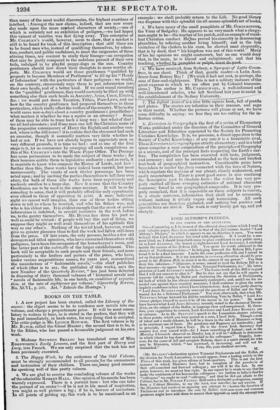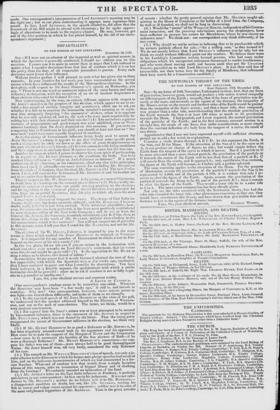LORD ALTHORP'S PLEDGES.
TO THE EDITOR OF THE SPECTATOR.
Sin—Concurring as I do inmost of the editorial observations which I read in your valuable paper, there is an article in that of the 22d instant, headed "Lord Althorp's Pledges," to xvhidi it appears to me an objection is open. You seem to imply that Lord ALTHOR P lEIS acted with duplicity. If I could for a TCLO, merit think so, I should henceforth cease to place confidence in any public man; for to Lord A LTHOEP, the honest straight-forward Lord Ammar, I attribute mainly the success of the Reform Bill. You quote his words addressed to the electors of Northamptonshire—" In bringing forward the Reform Bill, I pro- fessed it to be a final measure. I make the same profession still, and I intend to act on that profession. It is my intention, in case any alteration should be pro- posed in the Reform Bill, to resist it to the utmost of my power." You theo draw this inference—" Ministers, it seems intend to treat the Reform Bill as a final measure—to oppose Vote by Ballot, Triennial Parliaments, &c." My inter- pretation of Lord A LT IIORP'S words is—" The frame-work of this Bill is so good that I will not consent to alter it." But lie does not say that he will oppose a separate bill for voting by Ballot and shortening the duration of Parliaments, for both of which he has always strenuously contended ; and, until I see his re- corded vote against these essential measures, I shall continue to place the same implicit confidence in him which I have hitherto done. And, as you justly observe, "Lord JOHN RussEr.r. expressly reserved the questions of Ballot and the Sep- tennial Act for a Reformed Parliament." You state afterwards, that when Mi. TENNYSON brings forward his Bill for establishing Vote by Ballot, "Lord Ar.- THORP pledges himself to resist it by all the means in his power." He must have known what Lord Jon N Rossam. recently stated to the electors of Devon- shire, on the subject of the Ballot, in language clear and unequivocal. If, there- fore, your supposition be correct, Lord ALTHOEP and Lord Jour; RUSSELL are at variance. As to Mr. STANLEY'S speech to the Lancashire electors relating to these points, which you have quoted in a note, I heed little. Though a man of talent and a ready debater, he will be a thorn in. the side of Ministers so long as he continues one of them. His petulance and flippancy are intolerable; and in principle, I regard him a Tory. He is the worst Irish Secretary that country was ever cursed with—for I know something of Ireland ; and, as the Morning Chronicle observed on Monday last, it will be "difficult to determine in which island lie has done most mischief to his colleagues." Happily, how- ever, for the cause of full and complete Reform, there is a spirit abroad, let who may be Ministers, which . " has increased, is increasing and will not be
diminished." I am, Sir, your obedient servant, M.
(Mr. STANLEY'S dedaration against Triennial Parliaments and the Ballot, atz. the election for North Lancashire, it would appear, from a leading article in the Times of this week, has given offence at bead-quarters. This is not the fast instance in which Ministers have had to complain of the gaucherie of °their self-conceited and froward colleague ; nor will it be the last. In one point, however, we must set him right. In our report he is made to say that he spoke the sentiments of his honourable colleagues ; we incline to beEeve that for "colleagues" we ought to read "colleague," and that he did not allude to the Cabinet but to Mr.Witsox PATTEN. Still such a declaratic,n of opinion, comino. from a Cabinet Minister, to say the least, was uncalled for and unwise. I the Ministers had resolved on opposing any attempt to shorten the duration of Parliament and to introduce the vote by Ballot, common sense and common- prudence might have told them to reserve their oppositi.on until tbe attgropt was made. Our correspondent's interpretation of Lord ALTHORP'S meaning may be the right one ; but to our plain understanding it appears more ingenious than sound. In fact, Lord ALTHORP, in the speech alluded to, did allow that the framework of the Bill might be altered with advantage ; for he spoke approv- ingly of alterations to be made in the registry-clauses. He may, however, get out of the false position in which he has placed himself, by the aid of our corre- spondent's argument.]























 Previous page
Previous page